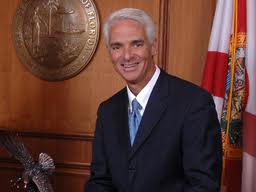Candidate Crist courts green FL votes without mentioning green costs

By William Patrick | Florida Watchdog
TALLAHASSEE, Fla. — Call it a green energy pledge for greenbacks.
Gubernatorial candidate Charlie Crist has vowed to use his future authority as governor to impose renewable energy standards similar to the 20 percent mandate he championed when last serving as Florida’s chief executive.
SOLAR FLARE: Former and potential future Sunshine State governor Charlie Crist touts solar energy but consumers would likely bare higher costs.
That much Crist made clear at a recent solar energy rally at the Florida Capitol. The event was sponsored by the Southern Alliance for Clean Energy, a 501(c)3 nonprofit.
“Right now we’re not utilizing the sunshine the way we need to,” Crist said. “God gives it to us. It comes up every morning.”
The former and potential two-time governor didn’t mention how he proposed to pay for clean energy.
The trade-off would include higher consumer prices and government subsidies, said Marita Noon, executive director of Energy Makes America Great, Inc.
“It sounds good to have free energy from the sun, but in reality it raises rates which, of course, hurts people who can least afford it,” Noon told Watchdog.org.
Noon met with several state lawmakers Tuesday to explain the costs and benefits of solar energy and other renewable resources.
“It’s feasible to get to 20 percent renewables,” she said. “It’s just going to take 20 to 25 years and raise everyone’s utility prices… If that’s what Floridians want, then so be it. But let’s be honest about it.”
Noon, who works in association with the Citizens Alliance for Responsible Energy, said she supports solar energy, but opposes government mandates and the subsidies that often accompany them.
“Individuals have every right to use solar energy, but they shouldn’t be forced to do it,” she said.
Over two dozen states have enacted renewable mandates and solar advocates point to sunny Florida as a natural solar state.
The Southern Energy Network, which partnered with the Southern Alliance for Clean Energy to host Crist at the Capitol, blames utility companies for the Legislature’s lack of green commitments.
“Florida is home to the country’s largest and dirtiest electric utilities — Duke Energy and Florida Power & Light. These corporations generate massive profits from the expansion of fossil fuels and nuclear power — dirty energy that threatens the health of Florida communities through pollution and climate change,” states an online rally flyer.
The rise of cheap natural gas along with stories of green energy cronyism, such as the $500 million hit taxpayers took from the Solyndra solar company, have left many Floridians skeptical of green energy.
Crist and renewable energy supporters are trying to focus on the positives.
“I met with a guy not long ago named Elon Musk,” said Crist. “He developed Tesla cars and a company called Solar City, one of the largest solar energy companies in North America, and he said, ‘Charlie, you guys ought to be the global example of solar energy on the planet. You’re the Sunshine State,’” said Crist.
But a Watchdog.org investigation revealed Solar City may not be the best energy solution for taxpayers.
“SolarCity, a California-based solar energy firm backed by hundreds of millions in federal grants and loans, posted $55 million in losses during 2013 and is running a deficit of more than $166 million, according to a recently release annual financial report,” reported Eric Boehm and Tori Richards.
According to the U.S. Energy Information Administration, only three other states have cheaper per capita energy costs than Florida. The EIA also states Florida generated 2.2 percent of its total energy from renewables in 2013.
Most of the state’s energy was generated by natural gas, which Noon sais is the dirty secret of solar energy.
“Renewables like wind and solar are dependent on natural gas because it’s the back-up fuel for when it’s not windy or sunny,” Noon said.
The Southern Alliance for Clean Energy is a 501(c)3 tax exempt nonprofit that claims to be nonpartisan. According to an Internal Revenue Service Form 990, the group’s total 2012 revenue exceeded $3.2 million.
IRS rules prohibit 501(c)3 charitable organizations from “participat(ing) in any campaign activity for or against political candidates.”
At the rally, Crist encouraged the crowd of roughly 300 to organize and get out the vote.
Contact William Patrick at wpatrick@watchdog.org







